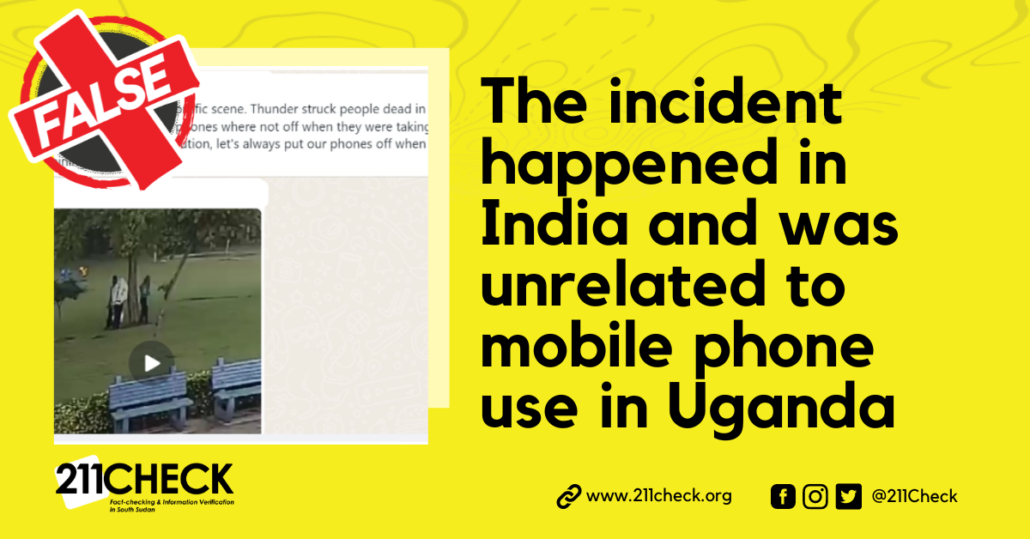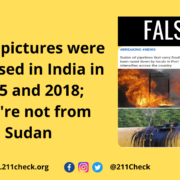Fact-check: Did thunder strike these people in Uganda because of mobile phones?
No, the incident happened in India and was unrelated to mobile phone use.
Writer: Ochaya Jackson
A message circulating on WhatsApp claiming that some people in Uganda were struck by thunder while taking shelter under a tree because their phones were on is false.
The message, accompanied by a 13-second video, alleges that the supposed casualties were struck dead because their phones were not switched off and warned people to put phones off when it is raining.
“Hi brethren. This is a horrific scene. Thunder struck people dead in Uganda because their phones where not off when they were taking shelter under a tree. Caution, let’s always put our phones off when it is raining (sic),” reads the text.
In the video, four people are seen falling to the ground after a lightning flash while sheltering under a tree as it rains.
Investigation:
A Google reverse image search returned that the video has been shared on various online platforms.
According to ‘WildFilmsIndia’, the video shows four men being struck by lightning while taking shelter during rain under a tree in Gurgaon Park, India. It was uploaded in March 2021.
The video was also shared here in December 2021, and the text accompanying it translates to a warning that people should avoid wired phones except in emergencies.
The same video was shared in January 2022 by here, accompanied by text that warned people not to take shelter under the tree and that they should turn off their phones or put them on flight mode.
This site also posted a video with an Arabic text that warned people to stay away from trees and tall metal objects during thunderstorms.
Findings
A keyword search on ‘thunder strike people in Uganda’ on Google returned several media reports regarding lightning strikes that killed people in Uganda but not because their phones were on when raining.
According to a BBC report in August 2020, 10 children were killed by a lightning strike in the Arua district of Uganda while sheltering in a grass-thatch hut.
In 2011, The Christian Science Monitor reported that lightning struck a primary school and killed 20 pupils, and about 100 were injured. No reference was made to mobile phones being the reason for the lightning strike.
It is also important to note that thunder is a sound wave caused by a flash of lightning and it is created when the lightning’s energy passes through the air. Lightning heats the air rapidly with a temperature of about 50,000 degrees Fahrenheit (27,760 degrees Celsius) and the rapid expansion and contraction creates the sound wave known as thunder, according to the National Weather Service.
Does a cell phone attract lightning? No
According to AccuWeather, cell phones do not attract lightning. However, using a landline phone during a thunderstorm is dangerous because of its connection to the outside wire as lightning follows the wire to the handset.
Scientific literature published by the National Centre for Biotechnology Information in 2006, which cited the US National Oceanic and Atmospheric Administration (NOAA) report, indicated that mobile phones are not a lightning strike risk.
Conclusion
Media reports about lightning strikes that killed people in Uganda did not cite mobile phones as the reason for attracting lightning when raining.
Additionally, there are no recent reports of such an incident in Uganda, and according to Ugandan Police Force Spokesperson Commissioner Fred Enanga, “We have never registered such an incident of lightning here. Most incidents are football-related, schools, gardening, and the chairs in the video are not common here (sic).”
On the other hand, reports from Indian media, as seen here and here, show that the incident took place in India. It was also said that the men only suffered burn injuries, and there is no mention of mobile phones as the cause.
No publicly available proof exists that lightning strikes people when it rains because of switching mobile phones on or using them. However, using landline phones when raining poses a risk.
This fact check was published by 211 Check with support from Code for Africa’s PesaCheck and the African Fact-Checking Alliance.
To ensure accuracy and transparency, we at 211 Check welcome corrections from our readers. If you spot an error in this article, please request a correction using this form. Our team will review your request and make the necessary corrections immediately, if any.
Fighting misinformation and disinformation in the media is crucial to avoiding fake news. Don’t share content you’re uncertain about. False information can harm and mislead people, risking their lives—Fact-check before sharing. For more details, visit https://211check.org/ or message us on WhatsApp at +211 917 298 255. #FactsMatter.









Thanks for your post.
Optim Investigators is a premier private investigation agency providing professional & confidential Private Investigation, Private Detective & Private Eye services to high profile clientele, small businesses, & families throughout the State of Florida.
https://optiminvestigators.com